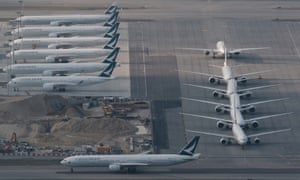Academics have called for stricter testing of the dog that tested ‘weak positive’ for coronavirus

Yesterday it was reported a pet dog in Hong Kong was continuing to return “weak positive” results for the coronavirus.
It first showed a “low level infection” last week, and was taken into isolation where it has shown further positive results. The dog’s owner has been diagnosed with Covid-19.
Health experts involved in the case agreed it was likely a human-to-animal transmission, despite the dog showing no symptoms.
“We discussed with other experts worldwide in this field. And we are pretty sure that this dog has a low level of infection, and it is confirmed,” said Dr Thomas Sit Hon-chung, assistant director of inspection and quarantine at the Agriculture, Fisheries and Conservation Department.
“I believe using the word ‘confirmed’ or ‘infected’ is suitable.”
However academics have called for stricter testing to rule out that the animal is simply contaminated without being infected.
Blood samples were taken on Tuesday, but results are a five-to-seven day wait.
“If the blood test for antibodies is positive, it means that the low-level infection is confirmed,” Professor Vanessa Barrs of City University, told the South China Morning Post.
“If the test is negative, it means either the dog was not infected, or that it had such a mild infection that it did not make antibodies.”
Prof Barrs, who is one of the experts involved with the case, said there was still no evidence people could be infected by their pets, and people shouldn’t panic.

More now on the beleaguered airlines.
Cathay Pacific, under increasing pressure from the coronavirus epidemic, is planning to close its Vancouver base in June, South China Morning Post is reporting.
The report said the closure, which was reportedly already on the cards but now brought forward, could cost up to 150 jobs.
The Vancouver crew base is the last one left for the airline in Canada, after it closed the Toronto base last year.
Airlines are particularly struggling amid the outbreak, as countries close borders to tourists from affected countries, and people avoid travel.
Industry bodies have warned the outbreak could cost US$113bn in revenue.
On Thursday British budget airline Flybe went into administration, cancelling all flights.

Donald Trump’s comments about the virus and the economy are interesting because it is an admission from him that the situation might get worse before it gets better – and because he has boasted so often about the record highs on the stock market since he came to power.
But despite a brief rally in the wake of the Fed’s emergency rate cut on Tuesday, stocks are falling fast again and Trump has been forced to change his tone.
Wall Street is on course for another battering on Friday judging by futures trading and what’s happening in Asia.
David Ingles
(@DavidInglesTV)Here’s the sorry state of financial markets right now.https://t.co/izcV9XSHsK pic.twitter.com/6y5FvbLG4q
The Nikkei in Tokyo is off more than 3% now, Seoul is down 2.27%, Hong Kong has lost 2% and . Shanghai is down 1%. In Australia, where shrinking retail sales have not helped, the ASX200 is 2% in the red.

Chinese premier Li Keqiang was visiting residential compound in Wuhan to inspect the work of community officials, who are supposed to be helping residents quarantined at home get food and needed supplies. Residents yelled out of their windows, “Fake, Fake”, apparently referring to the claims of the community workers.
People’s Daily, China
(@PDChina)#Wuhan resident yelled “it’s all fake” when Vice Premier was inspecting a residential complex on lockdown, calling out the hoax that community put together to cope with inspection as they failed to deliver daily necessities that were supposed to be sent to each family. pic.twitter.com/52XMUyGrfb

A Chinese researcher has told the People’s Daily that Wuhan will see no new cases by the end of this month. He also said that the rest of China, except Hubei, can begin ‘taking off their masks’ by the end of this month and return to normalcy.
China on Friday reported 143 new cases of the virus, up from 139, bringing the total number of cases in mainland China to 80,552. The death toll rose by 30 and stands at 3,042 as of the end of Thursday.
Gansu province reported 11 new cases, all passengers from Iran. All 311 passengers on the flight from Iran have been now been quarantined in Lanzhou, the capital of Gansu, according to CCTV.
Australia’s federal government has set up a national Indigenous advisory group to fast-track an emergency response plan for Aboriginal communities that are among the most vulnerable to any potential spread of Covid-19.
The taskforce met on Thursday as remote Aboriginal communities in South Australia began to strictly limit visitors for the next three months, worried that if Covid-19 arrives it will be “devastating” for their elders and people with existing health problems.
The Anangu Pitjantjatjara Yankunytjatjara (APY) have introduced strict rules for entry to their lands, which they can to do under the APY Land Rights Act.
“We are protecting our people, especially those who hold our ancient cultural knowledge, and we know they are already vulnerable as they are quite old,” APY general manager Richard King said.
“A lot of our people present with comorbidities like diabetes and renal failure. We have high smoking rates, overcrowding in housing, overall poor hygiene.
“It’s almost a perfect storm to support the transmission of these types of diseases.”
Updated



















